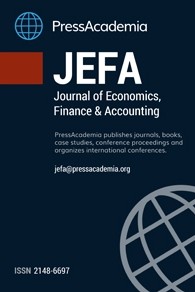SERMAYE HAREKETLERİ VE KONTROL MEKANİZMALARININ ETKİNLİĞİ
Amaç- Bu çalışmanın amacı, özellikle az gelişmiş ya da gelişmekte olan ülkelere yatırım yapan sermaye akımlarının kesintiye uğramasının nedenlerini sorgulamak ve aynı zamanda sermaye kontrollerinin etkili olup olmadığı konusunu irdelemektir.Metodoloji- Bu çalışmada, teorik olarak yabancı sermaye akımlarının girdiği ülkelerde yol açtığı temel değişiklikler, kaçmasına sebep olan başlıca unsurlar ve sermaye kontrol mekanizmalarının etkinliği literatür taraması temel alınarak irdelenmektedir.Bulgular- Kısa vadeli sermayenin temel makroekonomik göstergeler üzerindeki olası olumsuz etkilerini bertaraf etmek için, başlangıç noktasında sermaye kontrol mekanizmalarına ihtiyaç olduğu gözlenmektedir.Sonuç ve Öneriler- Günümüzde ülkeler arasında artan yoğun sermaye hareketleri, mevcut ekonomi teori ve politikalarının da tartışılmasına sebep olmuştur. Başta ‘’sıcak para’’ olarak adlandırılan kısa vadeli sermaye akımlarının ülkelere yatırım yapıp, koşullar değişince ani bir şekilde kaçması birçok problemin doğmasına yol açmıştır. Sonuç olarak; sürdürülebilir bir ekonomik kalkınma ve büyümenin temin edilebilmesi için, kısa vadeli yabancı kaynaklara yönelik olarak bazı kontrol mekanizmalarının uygulanması ve iç kaynaklar ile doğrudan yabancı sermayenin teşvik edilmesi gerektiği söylenebilir.
Anahtar Kelimeler:
Sermaye hareketleri, kontrol mekanizmaları, sıcak para, doğrudan yabancı sermaye, ani duruş
CAPITAL FLOWS AND THE EFFICIENCY OF CONTROL MECHANISMS
Purpose - The purpose of this study is to investigate the reasons for sudden stop of capital flows in developing and underdeveloped countries and the efficiency of some control mechanisms.Methodology - In this study, based on the literature review, the fundemental changes of foreign capital flows in home countries, the main reasons causing outflow and the efficiency of basic control mechanisms are investigated theoritically.Findings- It is observed that at the starting point, there is a need of control mechanisms for short term capital flows in order to eliminate their negative effects on basic macroeconomic indicators.Conclusion- In our days, the acceleration of capital flows between countries causes debates on current economics theories and policies. Capital flows between countries mainly specified as ‘’hot money’’ may create severe problems for home countries since they may outflow suddenly for varied reasons. In conclusion, it can be said that in order to acquire a sustainable economic development and growth; some control mechanisms should be applied for foreign short term capital flows and internal resources and foreign direct investments should be encouraged.
___
- Acemoğlu,D. (2009). Introduction to Modern Economic Growth, New Jersey: Princeton University Press.
- Brookings Institute, (2011, September). Rethinking Central Banking, Committee on International Economic Policy.
- Calvo, G. A. (1998). Capital Flows and Capital Market Crisis: The Simple Economics of Sudden Stops, Journal of Applied Economics, 1(1): 35-54.
- Calvo, G. A. Izquierdo, A. Mejia, L.F. (2004). On the Empirics of Sudden Stops: The Relevance of Balance Sheets Effects, NBER Working Paper, 10520, 22-46.
- Cassidy, J. (2009). How Markets Fail: The Logic of Economic Calamities. New York, NY: Farrar, Straus and Giroux.
- Chang, H.J. (1994). The Political Economy of Industrial Policy. New York, NY: St. Martin’s Press.
- Kaminsky, G. L. Vega-Garcia, P. (2014, April). Variaties of Sovereign Crises: Latin America 1820-1931, NBER Working Paper Series, 20042, 41-56.
- Magud, N. E., Carmen M. R., Rogoff, K. S. (2011, February). Capital Controls : Myth and Reality-A Portfolio Balance Approach, NBER Working Paper, 12-27.
- Magud, N.E. Reinhart, C. M. Vesperoni, E.R. (2012, February). Capital Inflows, Exchange Rate Flexibility and Credit Booms, IMF Working Paper, 19-32.
- Magud, N. Reinhart, C. M. Rogoff, K. (2011). Capital Controls : A Meta Evaluation Approach, Peterson Institute for International Economics, (Çevrimiçi), https://mpra.ub.uni-muenchen.de/30274/
- Minsky, H.P. (1993). The Financial Instability Hypothesis. Radical Political Economy, Ed. by Philip Arestis, Malcom Sawyer, NY: Edward Elgar Aldershot.
- Montiel, P. J. (2013, May). Capital Flows : Issues and Policies, Inter-American Development Bank Working Paper Series, IDB-WP-411,11-28.
- Montiel, P. Reinhart, C. M. (1999, August). Do Capital Controls and Macroeconomic Policies Influence the Volume and Composition of Capital Flows ? Evidence from 1990’s , Journal of International Money and Finance, 18( 4), 624-648.
- Paya, M. M. (2013). Küresel Ortamda İktisat Politikaları. İstanbul: Türkmen Kitabevi.
- Reinhart C. M., Rogoff, K. S. (2004) Serial Default and the Paradox of Rich to Poor Capital Flows, American Economic Review, 94(2) : 52-58.
- Reinhart C. M., Rogoff, K. S. (2013, December). Financial and Sovereign Debt Crises : Some Lessons Learned and Those Forgotten, IMF Working Paper, WP/13/266.
- Rodrik, D. (2007). One Economics Many Recipes : Globalization, Institutions and Economic Growth, New Jersey : Princeton University Press.
- Shuhan, P. Claessens, S. Mamingi, N. (1993, July). Equity of Bond Flows to Asia and Latin America The Role of Global and Country Factors, WPS 1160, International Economics Department, The World Bank.
- Sula, O. Willett, T. D. ( 2006). The Reversibility of Different Types of Capital Flows to Emerging Markets, MPRA Paper, 384, University Library of Munich, Germany, (Çevrimiçi), http://mpra.ub.uni-muenchen.de/
- Yayın Aralığı: Yılda 4 Sayı
- Başlangıç: 2014
- Yayıncı: PressAcademia
Sayıdaki Diğer Makaleler
Nurgun Komsuoglu YİLMAZ, Hulya Boydas HAZAR
ASYA ÜLKELERİNİN DÖVİZ KURU SEÇİMİNİ ETKİLEYEN FAKTÖRLER
SOSYAL SORUMLU YATIRIMDAN ETKİ YATIRIMLARINA: SOSYAL FİNANSTA GÜNCEL GELİŞMELER
SERMAYE HAREKETLERİ VE KONTROL MEKANİZMALARININ ETKİNLİĞİ
